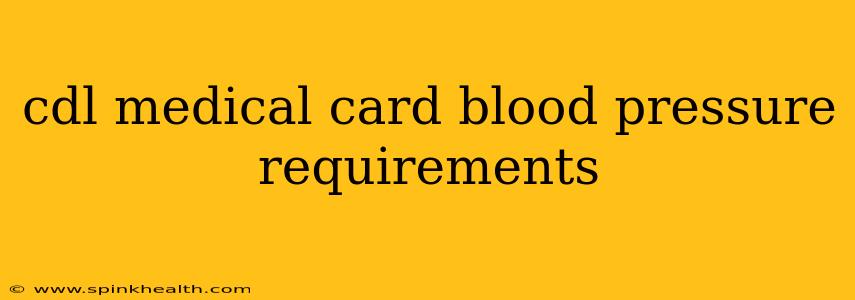The journey to obtaining a Commercial Driver's License (CDL) involves more than just mastering driving skills. It's a rigorous process that prioritizes health and safety, with stringent medical standards to ensure drivers are physically fit to operate large vehicles. One critical aspect of the CDL physical exam is the blood pressure check. This post delves into the specifics of blood pressure requirements for a CDL medical card, addressing common questions and concerns.
What is the Blood Pressure Limit for a CDL?
The Federal Motor Carrier Safety Administration (FMCSA) sets the standards for CDL medical certification. They don't have a single, inflexible blood pressure number that automatically disqualifies you. Instead, they focus on a range and consider other factors. Generally, a blood pressure consistently exceeding 140/90 mmHg is a cause for concern and might lead to disqualification or require further evaluation. It's crucial to remember that these are guidelines, and your individual circumstances will be assessed by the medical examiner.
Can High Blood Pressure Prevent Me From Getting a CDL?
This isn't a simple yes or no answer. While consistently high blood pressure (hypertension) can indeed prevent you from getting a CDL, it depends on several factors:
- Severity: Mild, well-controlled hypertension might not automatically disqualify you. Your doctor and medical examiner will consider how well your blood pressure is managed with medication or lifestyle changes.
- Consistency: A single high reading doesn't necessarily disqualify you. Consistent readings over the recommended limits are more concerning.
- Underlying Conditions: The cause of your hypertension is relevant. If it's due to a manageable condition, you might still qualify. However, severe underlying health issues could lead to disqualification.
Essentially, it's a case-by-case evaluation. Don't assume you're automatically out if you have high blood pressure. Consult your doctor and be prepared to provide a comprehensive medical history.
What Happens if My Blood Pressure is Too High During the CDL Physical?
If your blood pressure is too high during your CDL physical exam, the medical examiner might:
- Recommend further testing: They might request additional blood work, stress tests, or other evaluations to assess the severity and underlying causes of your hypertension.
- Request treatment: They'll likely recommend you see your doctor to manage your blood pressure.
- Issue a conditional certification: In some cases, if your hypertension is well-controlled through medication and lifestyle adjustments, a conditional certification might be issued, which could later be updated to a full certification upon meeting specific requirements.
- Recommend retesting: They may ask you to return for another examination after treatment and blood pressure management.
How Can I Improve My Chances of Passing the CDL Blood Pressure Test?
The best approach is proactive health management. Before your CDL physical:
- Visit your doctor: Get your blood pressure checked regularly and address any hypertension concerns well in advance of your CDL physical. Effective management is key.
- Adopt a healthy lifestyle: Focus on diet, exercise, and stress reduction techniques. These contribute significantly to maintaining healthy blood pressure.
- Be honest and transparent: Fully disclose your medical history to your doctor and the medical examiner conducting your CDL physical. This is essential for an accurate assessment.
What Medications Affect My Eligibility for a CDL?
Certain medications used to treat hypertension might impact your eligibility. It's crucial to discuss all medications you're taking with your doctor and the medical examiner. They can assess whether the medication itself, or any potential side effects, might be a concern.
What if I've had a Stroke or Heart Attack?
A history of stroke or heart attack significantly impacts your eligibility for a CDL. It often leads to disqualification unless there's substantial evidence that your condition is under excellent control and that the risk of recurrence is minimal. This requires thorough evaluation and documentation.
Remember, your health and safety are paramount. Open communication with your doctor and the medical examiner is crucial. Proactive health management significantly improves your chances of successfully obtaining your CDL medical card. This entire process prioritizes safety on our roads and highways.

